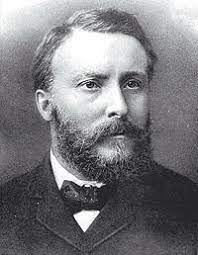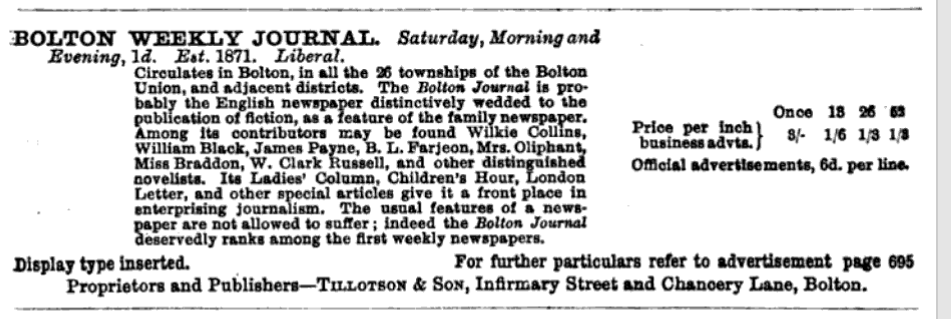In the twenty-two years from 1867 to 1889, the Tillotson family business grew from a well-established, local printers and stationers in Bolton to a major regional newspaper publisher and an international syndicator of serialisation rights. The offices in Bolton spawned branches in New York and Berlin, as the company sought to penetrate new markets in Europe, the Empire and beyond.
As Graham Law writes in Serializing Fiction in the Victorian Press:
“there seems little doubt that the enterprise and energy underlying all these risky but finally successful business ventures derived largely from W. F. Tillotson himself” (Law, 2000, p64).

Despite William Frederic Tillotson’s importance in publishing history, biographical information about him is limited. His paternal grandfather, the Reverend Samuel Tiillotson came to Bolton from Sowerby in Yorkshire and served as the minister at the Primitive Methodist church on Higher Bridge Street. His maternal grandfather, Robert Marsden Holden, had established a printing business in Mealhouse Lane in 1827 (Singleton, 1950, p.1). His father, John Tillotson, had been apprenticed to Robert Holden, married Holden’s daughter, and eventually took over the business in 1850. William Frederic Tillotson, who served his apprenticeship under his father seemed set to inherit an established, moderately successful local business.
While John Tillotson appears to have been more cautious than his son, “Willie” persuaded him to publish Britain’s first local evening newspaper, the Bolton Evening News in 1867. By the time of his death in 1889, at the age of forty-four, W.F. Tillotson had added weekly titles, such as the Bolton Weekly Journal and its sister papers, to become a powerful figure in the regional press. He had also set up what was to become the Tillotson Fiction Bureau and established direct relationships with many of the leading authors of the period. He had established satellite offices in New York and Berlin, and had become a major player in the syndication of fiction across much of the world. He had also found time to become a founding member of the Press Association, serve as Justice of the Peace, act as Honorary Treasurer of the Liberal Association and work as an active member of the local infirmary committee (Singleton, 1950, p.11). Even by Victorian standards, Tillotson’s drive and energy was prodigious.

Graham Law describes William Tillotson as “precise and meticulous, rather short in stature, almost dapper, and normally gentle and reticent” (Law, 2000, p.66). As a non-conformist in religion, William Tillotson shared the Liberal sympathies common among chapel-goers of the time. Although Frank Singleton, in his 1950 history of Tillotson’s was largely correct in claiming that the Journal series were” never bound to a party or section” (Singleton, 1950, p.19), W.F. Tillotson’s Liberal sympathies were widely known. A contemporary newspaper directory of the time describes the editorial sympathies of both the Bolton Evening News and the Bolton Weekly Journal as Liberal (Sell, 1887, p 204).
On his death in 1889, William Tillotson’s widow, Mary Tillotson (sister to Lord Leverhulme) was his sole beneficiary and took on a leading role in the management of the business, before the business was passed on to the next generation. The family finally gave up its stake in the business in 1971.
Bibliography
Law, Graham. (2000) Serializing Fiction in the Victorian Press. Houndmills: Palgrave.
Sell, Henry. (1887) Sell’s Dictionary of the World’s Press. London: Sell’s Advertising Agency.
Singleton, Frank. (1950) Tillotson’s 1850-1950: Centenary of a Family Business. Bolton: Tillotson & Son Ltd.
Bibliography
Colby, Robert A. (1985) “Tale Bearing in the 1890s: The Author and Fiction Syndication”. Victorian Periodicals Review. Vol.18, No.1, pp. 2-16.
Hilliard, Christopher (2009) “The Provincial Press and the Imperial Traffic in Fiction, 1870s-1930s”. Journal of British Studies. Vol.48, No.3, pp. 653-673.
Johanningsmeier, Charles (1995) “Newspaper Syndicates of the Late Nineteenth Century: Overlooked Forces in the American Literary Marketplace”. Publishing History. Vol. 37, No.1, pp. 61-82.
Jones, Aled (1984) “Tillotson’s Fiction Bureau: The Manchester Manuscripts”. Victorian Periodicals Review. Vol.17, No.1, pp. 43-49.
Singleton, Frank (1950) Tillotson’s 1850-1950: Centenary of a Family Business. Bolton: Tillotson & Son Ltd.










